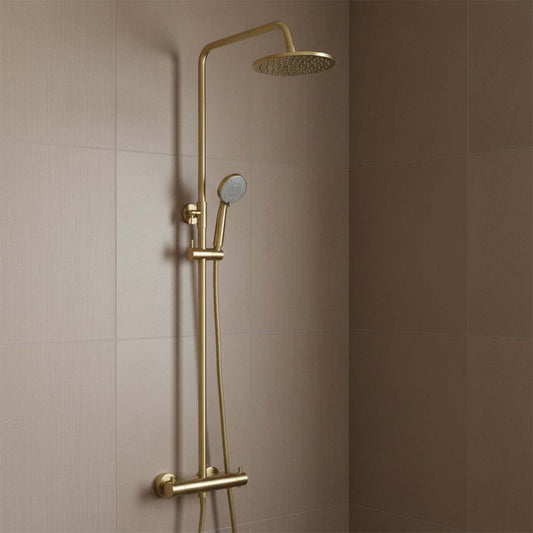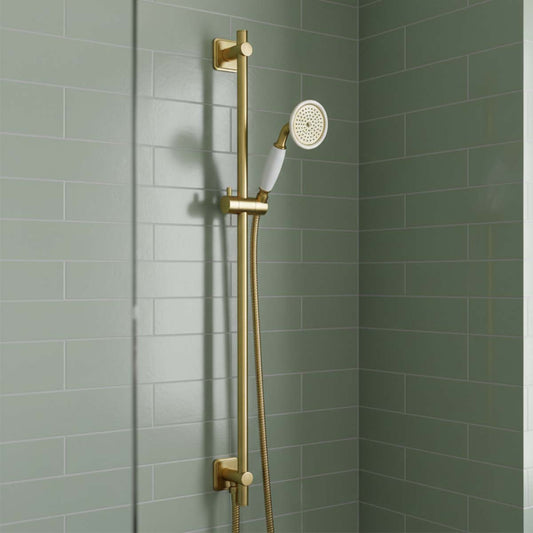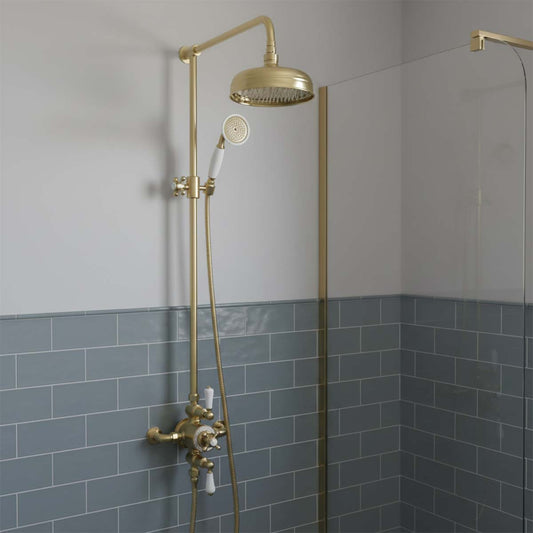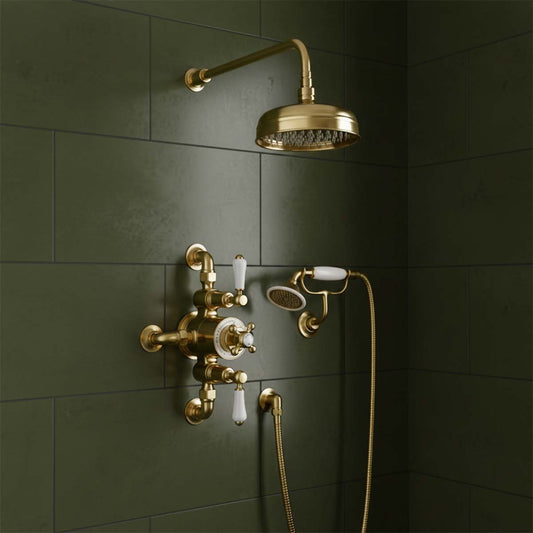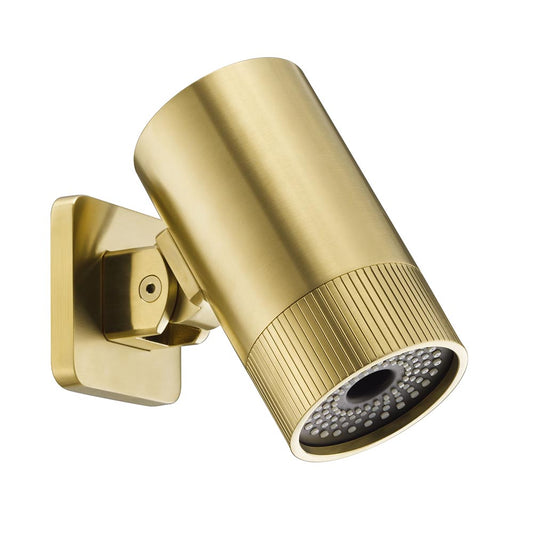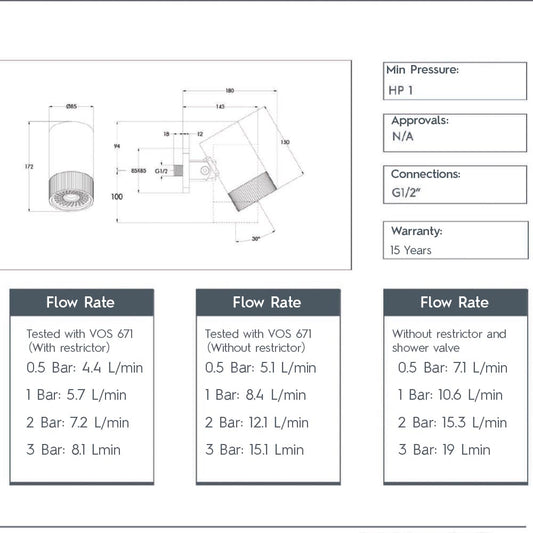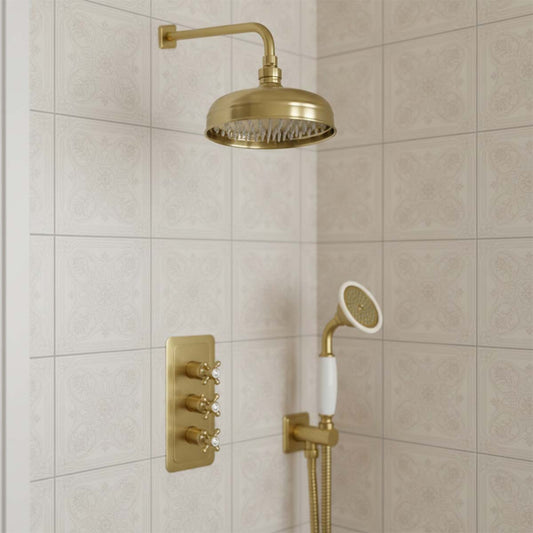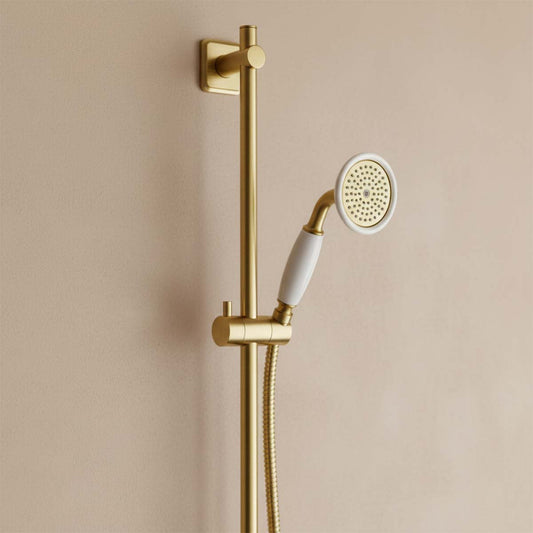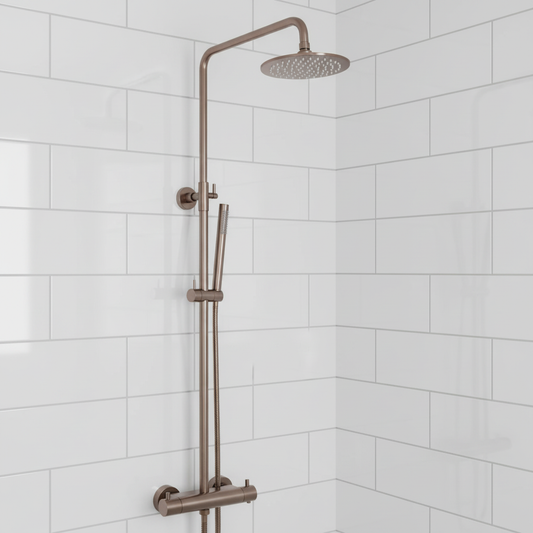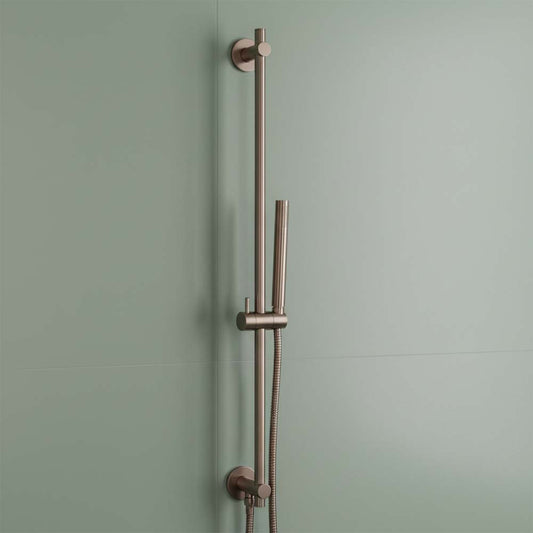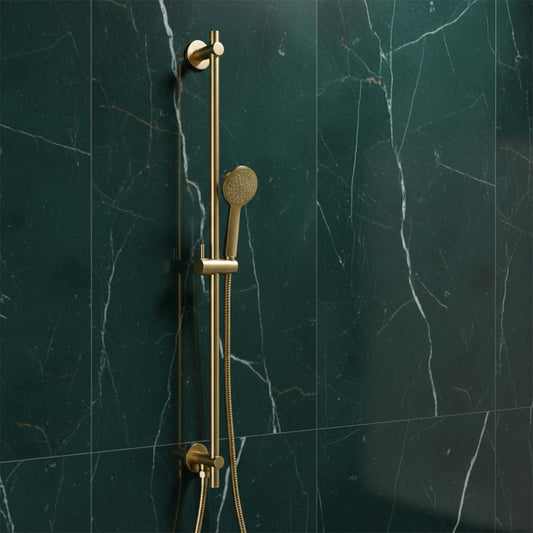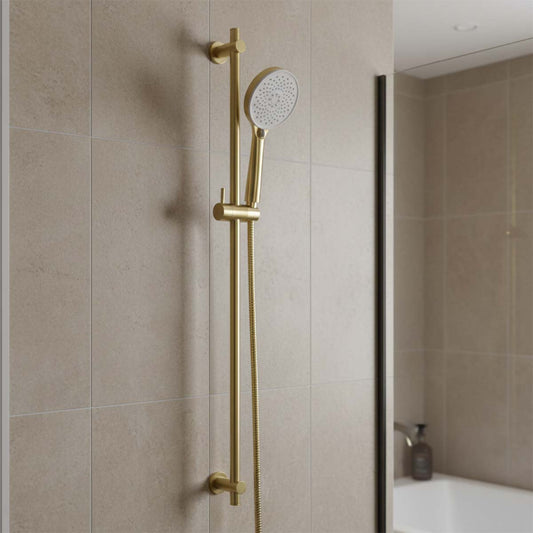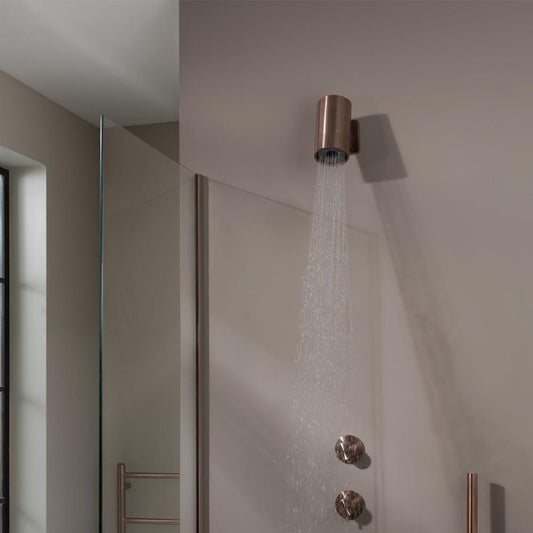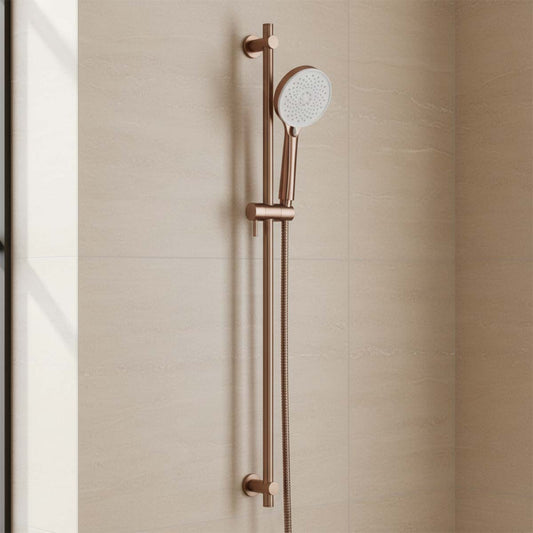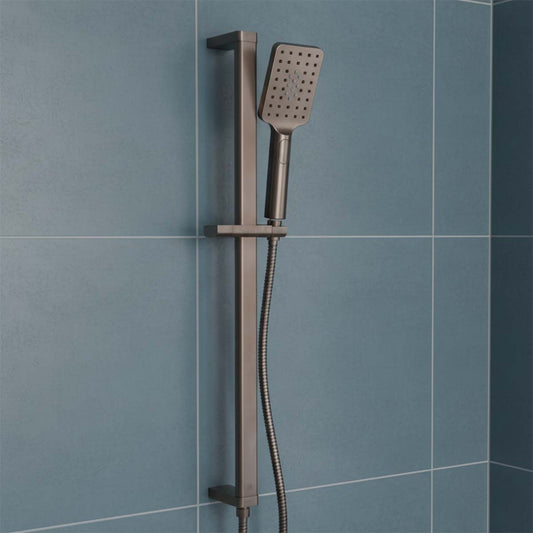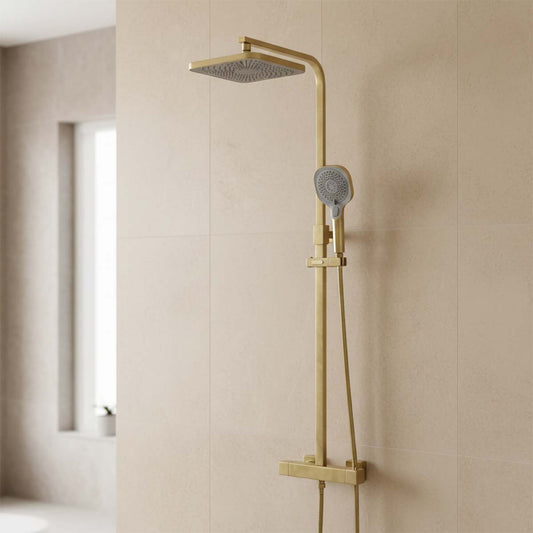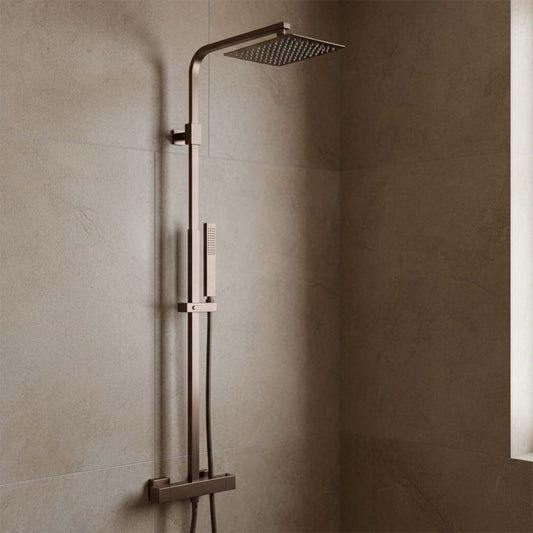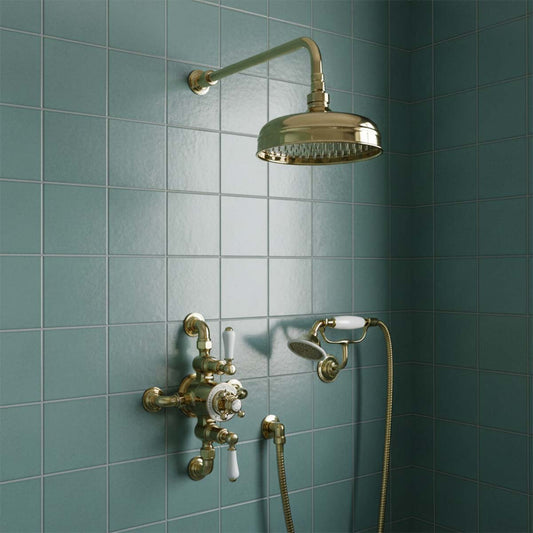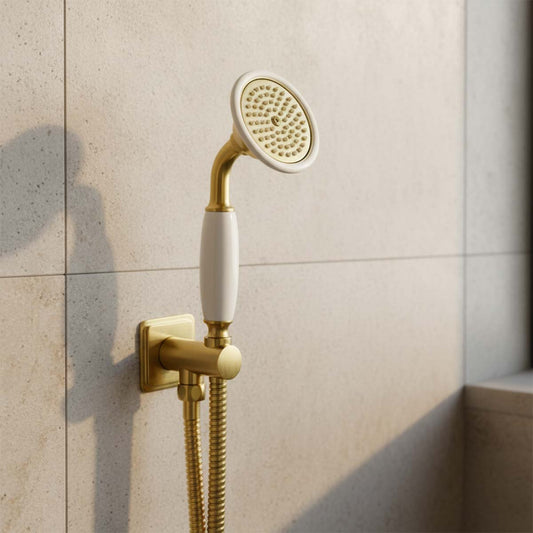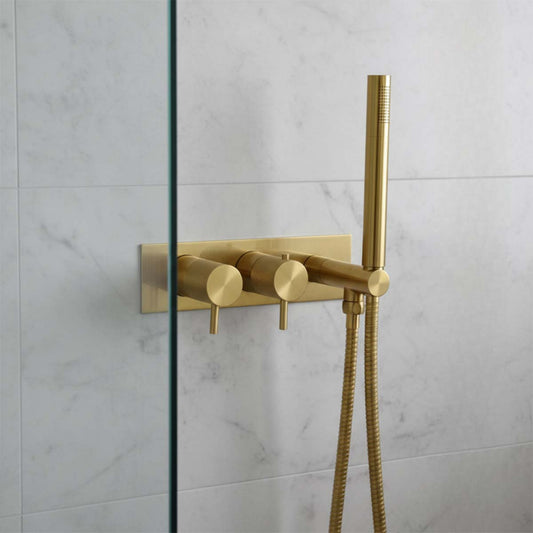Unveiling the Mystery: Why Is My Shower Leaking?
Table Of Contents:
-
Introduction
→ -
Shower Heads, Arms And Risers Collection
→ -
Understanding Common Causes of a Leaking Shower
→ -
Signs of a Leaking Shower
→ -
Can a Leaking Shower Pose a Threat?
→ -
How Do I Detect Leaks Behind Tiles or Under the Shower Tray?
→ -
Fixing a Shower Leak: Steps to Fix Shower Leak
→ -
Cost of Fixing a Leaking Shower
→ -
Replacement considerations for your leaking shower
→ -
Conclusion
→ -
Frequently Asked Questions
→
Introduction
A leaking shower can be more than just an inconvenience—it can lead to costly repairs and water damage if not addressed quickly. Whether you’ve noticed water pooling around the shower or simply suspect a leak, it’s important to identify and address the issue as soon as possible. A minor leak might seem harmless at first, but it can gradually worsen, leading to damp walls, ceilings, and floors, which are not only a hassle to repair but can also cause mold and mildew buildup.
In this blog, we’ll help you unravel the mystery behind why your shower is leaking. We’ll cover the signs of a leaking shower, potential causes, and how to detect hidden leaks. Additionally, we’ll discuss some of the best solutions to prevent further damage, and help you decide when it’s time to seek professional help.
Understanding Common Causes of a Leaking Shower
A leaking shower can cause significant water damage to your bathroom and even the structure of your home if left unchecked. Identifying the common causes of a shower leak is essential to solving the problem before it escalates. Here’s an overview of the typical reasons showers leak and how you can prevent or fix them:

1. Damaged or Worn-Out Caulking
Caulking serves as a sealant around the edges of your shower, where the walls meet the floor, or where the shower meets the bathtub. Over time, caulking can deteriorate due to exposure to water and humidity, allowing water to escape and seep into unwanted areas.
Common Cause: Aging, cracked, or missing caulking around the shower.
Fix: Regularly inspect and replace the caulking as needed to maintain a tight seal. Silicone caulk is ideal for wet areas like showers.
2. Leaky Showerhead or Tap
A leaking showerhead or tap can lead to constant water drips, even when you’re not using the shower. Sometimes, the issue is as simple as a worn-out washer or gasket, but other times it could indicate more serious plumbing problems behind the walls.
Common Cause: Worn-out washers, damaged tap valves, or loose connections.
Fix: Inspect and replace any faulty washers or gaskets, and tighten any loose connections. If the leak persists, it may require professional help to replace the tap or showerhead.
3. Cracked or Damaged Tiles
Tiles in the shower are meant to provide a waterproof surface, but cracks or chips in the tiles can lead to leaks. Water can seep into the cracks, and if it’s not addressed, it may get behind the tiles, leading to wall damage and even mold growth.
Common Cause: Cracked or loose tiles that allow water to seep through.
Fix: Replace any damaged tiles and re-grout the spaces between tiles to ensure a waterproof seal. Ensure the grout is sealed properly to prevent water infiltration.
4. Improper Installation
Shower installations that aren't properly sealed or aligned can easily result in leaks. This includes issues with the shower tray, door seals, or tiles that aren't properly secured. If the shower wasn't installed according to industry standards, it can lead to gaps and leaks.
Common Cause: Poorly installed tiles, misaligned shower doors, or unsealed shower trays.
Fix: Ensure your shower was installed correctly. If you suspect improper installation, consider hiring a professional to inspect and fix the issues.
5. Clogged Drain
A clogged shower drain can cause water to pool on the shower floor instead of draining properly. This standing water can overflow, leaking outside the shower area and causing water damage.
Common Cause: Hair, soap scum, or debris blocking the drain, leading to slow drainage.
Fix: Regularly clean the drain to remove debris. Use a drain snake or plunger to clear any clogs, or call a plumber for persistent drainage issues.
6. Leaky Pipes Behind the Walls
If the pipes that supply water to the shower are damaged or leaking behind the walls, you may not notice the problem right away. However, over time, water will leak out from the pipes, potentially causing structural damage and encouraging mold growth.
Common Cause: Leaking pipes hidden behind shower walls.
Fix: If you notice water stains on the ceiling or walls, it could be a sign of a hidden leak. A professional plumber will need to inspect and repair the pipes.
7. Damaged Shower Tray or Base
The shower pan or base directs water to the drain and is usually made of acrylic or fiberglass. Over time, it can crack or become damaged, allowing water to leak out from under the shower.
Common Cause: Cracked or damaged shower pan or base.
Fix: If the shower pan is cracked or damaged, it must be replaced. If you’re unsure about the extent of the damage, call a professional to assess and fix it.
8. Faulty Waterproofing
Behind the tiles, a waterproofing membrane is essential to prevent water from leaking into the wall structure. If this membrane becomes damaged or was improperly installed, water can easily escape, leading to leaks.
Common Cause: Deterioration of the waterproofing membrane or inadequate installation.
Fix: If waterproofing is the issue, it may require removing the tiles to inspect and replace the waterproofing material behind the walls or shower base.
9. Faulty Shower Doors or Screens
Shower doors and screens are designed to keep water inside the shower area. If they are misaligned, damaged, or the seals are worn out, water can escape through gaps.
Common Cause: Worn-out seals, misaligned doors, or faulty shower screens.
Fix: Check the door seals regularly and replace them if necessary. Ensure that the doors are properly aligned and close tightly to prevent water from leaking outside the shower.
10. Damaged Grout
Grout is used to fill the spaces between tiles, preventing water from leaking behind them. Over time, grout can crack, shrink, or become porous, allowing water to seep through.
Common Cause: Cracked, missing, or worn-out grout between tiles.
Fix: Re-grout the tiles to restore a waterproof barrier. Applying a grout sealer can also help protect it from water damage.
Understanding the common causes of shower leaks is the first step in preventing water damage to your bathroom and home. Regular maintenance, such as inspecting caulking, grout, and seals, can help you catch issues early. If you notice any signs of a shower leak, such as water stains, mold growth, or a damp floor, it’s essential to address the problem quickly. For more serious plumbing issues, calling a professional plumber or contractor can help ensure a lasting solution to your leaking shower.
Signs of a Leaking Shower
If you suspect a leaking shower, identifying the signs early is essential to prevent extensive water damage. Here are some key signs of a leaking shower to help you figure out if there’s an issue:
1. Visible Water Stains
Water stains on the ceiling below the bathroom or on the walls surrounding the shower are often the first visible sign of a leak. These stains are caused by water escaping from the shower and traveling through the ceiling or walls.
What to look for:
-
Dark patches or discoloration on the ceiling, walls, or floor.
-
Water stains on walls near the shower or in adjacent rooms.
2. Mold or Mildew Growth
Excess moisture from a shower leak can create the perfect breeding ground for mold and mildew, especially in hidden areas like behind walls or under the floor.
What to look for:
-
Black or greenish mold spots on walls, grout, or ceiling.
-
Musty or damp smell in the bathroom, even when the shower is not in use.
3. Damp or Wet Floor
A constantly damp floor outside the shower, even when the shower hasn’t been used recently, can indicate a slow leak from the shower itself. This could mean water is escaping through cracks or gaps in the shower base or walls.
What to look for:
-
Water pooling on the floor, particularly near the base of the shower.
-
Unexplained dampness around the shower door or walls.
4. Cracked or Loose Tiles
Tiles can crack or loosen if water seeps behind them, causing long-term structural damage. Cracked tiles or grout lines are often the first signs that water is getting behind the shower walls.
What to look for:
-
Cracks, chips, or loose tiles around the shower area.
-
Gaps between tiles where water may be able to seep through.
5. Increased Water Bills
A hidden leak can lead to a noticeable increase in water consumption, which may show up on your monthly water bill. If you haven’t changed your water usage habits but notice a spike in the bill, it could be due to a slow leak in your shower.
What to look for:
-
A sudden, unexplained rise in water consumption.
6. Dripping Sounds
If you hear water dripping even when the shower is turned off, there could be a leak somewhere in the plumbing system or shower fixture. This is a clear sign that water is leaking from the pipes or showerhead.
What to look for:
-
The sound of dripping water, even when the shower is not in use.
-
Drips coming from the showerhead or faucet.
7. Peeling Paint or Wallpaper
In bathrooms, where humidity is high, paint and wallpaper are more vulnerable to water damage. If you notice peeling or bubbling paint on the walls around the shower, it could be because of a leak.
What to look for:
-
Bubbling or peeling paint on the bathroom walls.
-
Wallpaper that is damaged or lifting.
8. Wet Walls or Grout
If the grout between tiles is cracked or the wall feels wet to the touch, this can be a sign of water getting behind the tiles. This can cause damage to the drywall or subfloor underneath.
What to look for:
-
Damp or wet walls.
-
Cracked, damaged, or missing grout lines.
9. Water Pooling Around the Shower Base
If you notice water pooling around the base of your shower after each use, it could be a sign that the shower tray, drain, or caulking is damaged, allowing water to leak out.
What to look for:
-
Water around the base of the shower after use.
-
Persistent puddles near the edges of the shower floor.
10. Shower Base or Caulking Damage
Cracked or missing caulking around the shower base or between tiles can let water escape into the floor and walls. This is a common source of leaks, especially if the caulking has degraded over time.
What to look for:
-
Cracked or missing caulking around the shower.
-
Visible gaps in the caulking near the shower edges or corners.
If you notice any of these signs, it's crucial to investigate the source of the leak as soon as possible. Leaks can lead to mold, water damage, and higher repair costs if left unchecked. Fixing the problem early, whether it’s replacing damaged caulking, fixing tiles, or addressing plumbing issues, can help protect your bathroom from further damage. If you’re unsure of the cause, it’s always a good idea to consult a professional to ensure the issue is fixed properly.
Can a Leaking Shower Pose a Threat?
Yes, a leaking shower can pose a significant threat if left unaddressed. While it may seem like a minor issue at first, the damage from a shower leak can become extensive over time, leading to costly repairs and even health risks. Here are some of the potential threats a leaking shower can pose:
1. Water Damage to Surrounding Structures
A leaking shower can lead to water seeping into walls, ceilings, and floors. Over time, this water damage can weaken the structural integrity of your home, leading to issues such as:
-
Warped or rotting wood: Continuous exposure to water can cause wooden studs, beams, and subfloors to rot.
-
Damage to drywall: Wet drywall can become soft, crumbly, and weak, causing walls to deteriorate.
-
Floor damage: Prolonged moisture exposure can damage floors, especially wooden or laminate ones, and lead to mold growth under tiles or beneath the floor.
2. Mold and Mildew Growth
One of the biggest dangers of a leaking shower is the development of mold and mildew. Damp environments caused by leaks create the perfect breeding ground for these fungi. Mold and mildew can grow in hidden spaces behind tiles, inside walls, or under floors, which can lead to serious health risks such as:
-
Respiratory issues: Mold spores can cause or exacerbate respiratory conditions like asthma, bronchitis, or allergies.
-
Health complications: Prolonged exposure to mold can lead to more severe health issues, including infections, particularly in vulnerable individuals like children, the elderly, or those with weakened immune systems.
3. Increased Utility Bills
If the leak is connected to a plumbing issue, such as a leaking pipe or faucet, it can lead to increased water usage. Even a small drip can waste a significant amount of water over time, which can show up on your water bill. A leaking shower can quietly lead to higher-than-normal water consumption, which may not be immediately noticeable but adds up over time.
4. Unpleasant Odors
A leaking shower, particularly one that leads to water pooling under the floor or behind tiles, can create a musty, unpleasant smell in the bathroom or adjacent rooms. The moisture encourages the growth of bacteria and mold, which release foul odors. These smells can be difficult to eliminate without fixing the leak and addressing the underlying moisture problem.
5. Risk of Electrical Damage
In extreme cases, if water from a leaking shower makes its way into electrical wiring or outlets, it can pose a serious safety hazard. Water and electricity don’t mix, and exposure to moisture can cause electrical malfunctions, short circuits, or even fires. This is especially concerning if water seeps into the walls or ceiling near light fixtures or electrical outlets.
6. Foundation Damage
If a shower leak goes unnoticed for a prolonged period, water may start to seep into the foundation of your home, particularly if the leak is related to plumbing issues within the walls. Water can weaken the foundation, leading to cracks, settling, or shifting of the building, which may result in expensive repairs to fix the foundation.
7. Costly Repairs
If a shower leak isn’t caught early, the damage can escalate, leading to extensive repairs that could include replacing drywall, flooring, tiles, plumbing, or even structural elements of your home. Repairing a leaking shower may start as a simple task, but if the problem is allowed to fester, it could result in thousands of dollars in damage.
8. Decreased Property Value
A leaking shower, especially one that causes water damage or mold growth, can reduce the value of your home. Potential buyers may be wary of buying a property with known water damage, leading to lower sale prices or difficulties in selling your home. If you plan on selling your house in the future, it’s essential to fix any leaks promptly.
A leaking shower, if left unchecked, can lead to significant problems ranging from structural damage to health issues. The risks of mold growth, water damage, and higher utility bills can quickly add up, and it’s essential to address the problem as soon as it’s noticed. If you suspect a shower leak, it’s important to act quickly—whether by fixing it yourself or calling a professional—to minimize damage and avoid long-term consequences.
How Do I Detect Leaks Behind Tiles or Under the Shower Tray?
Detecting leaks behind tiles or under the shower tray can be tricky because the damage often isn't visible right away. However, there are several methods you can use to identify if there’s a hidden leak causing issues. Here's how to go about detecting leaks in these areas:

1. Look for Visible Signs of Water Damage
Even if the leak is hidden behind tiles or under the shower tray, there may still be signs of water damage on the surface. Look for any of the following:
-
Water stains or discoloration on the walls, ceiling, or floor surrounding the shower.
-
Peeling paint or wallpaper in areas adjacent to the shower.
-
Dampness or moisture on the floor outside the shower or on the wall near the shower.
-
Mold or mildew growth in corners or along grout lines, especially in areas adjacent to the shower.
2. Perform a Visual Inspection
Check the grout lines, tile edges, and caulking for any signs of cracking, wear, or gaps. These are common areas where water can seep behind tiles or under the tray. If you spot any of these issues, it could indicate a potential leak.
What to Look For:
-
Cracked, missing, or discolored grout between tiles.
-
Gaps or cracks in the caulking around the edges of the shower tray, walls, or corners.
-
Loose tiles that may indicate that water has been seeping underneath.
3. Check for Water Pooling
If you notice water pooling on the shower floor, outside the shower, or near the base of the walls, this could be an indication of a leak behind the tiles or under the tray. In some cases, water can escape from the tray’s base and settle underneath the flooring, causing damage that may not be immediately visible.
What to Look For:
-
Water that doesn’t drain properly after you shower.
-
Pooling or damp areas around the edges of the shower tray, especially if the floor is sloped correctly but water still collects.
4. Conduct a Leak Test Using Food Coloring (for Shower Tray Leaks)
If you suspect a leak under the shower tray but can’t see it, you can try a simple leak test using food coloring. This can help determine if water is escaping from the tray or around the edges.
How to Do It:
-
Add a few drops of food coloring to the water in your shower tray.
-
Leave the shower door or curtain closed for a few hours.
-
After waiting, check outside the tray (on the floor, adjacent walls, or around the edges of the shower) for signs of the food coloring. If you see the colored water, it’s likely that water is leaking under or around the tray.
5. Use a Moisture Meter
A moisture meter is a tool that can detect the presence of water within surfaces such as walls and floors. This can be an effective way to detect hidden moisture behind tiles or under the shower tray.
How to Use It:
-
Purchase or rent a moisture meter from a hardware store.
-
Place the probe against the wall or floor near the shower and look for abnormal readings, which would indicate excessive moisture.
-
Focus on areas around the edges of the shower, where leaks are more likely to occur.
6. Look for Musty Smells
If there's a hidden leak behind the tiles or under the tray, the excess moisture can encourage the growth of mold and mildew. If you notice a musty smell in your bathroom, especially in areas around the shower, it could be a sign that there’s water trapped behind the surfaces.
What to Look For:
-
A persistent musty or damp smell, even when the bathroom is well-ventilated.
-
Visible mold growth around the edges of the shower or floor.
7. Check for Loose or Sagging Shower Tray
If the shower tray is shifting, sagging, or moving when pressure is applied, it may indicate that water is accumulating beneath it. The tray could have cracked or become detached, allowing water to leak underneath and into the subfloor.
What to Look For:
-
The tray moves or makes noise when you step on it.
-
Gaps or misalignment between the tray and surrounding tiles.
8. Monitor Your Water Bill
An unexplained increase in your water bill could indicate a hidden leak. If your shower is leaking behind the tiles or under the tray, water is being wasted constantly, even when you’re not using the shower.
What to Look For:
-
A sudden, significant rise in water usage without any change in your daily habits.
-
Increased water consumption despite normal shower frequency.
9. Professional Inspection
If you're unable to find the leak or the issue seems more complex, it's time to call a professional plumber or contractor. They may use specialized equipment like thermal imaging cameras, which can detect temperature changes in surfaces caused by water behind tiles or under the tray.
What to Expect:
-
A plumber may use thermal or infrared imaging to detect temperature changes in the walls or floor, which can indicate the presence of moisture.
-
Professional tools like pressure tests may be used to identify leaks in the plumbing that are causing the issue.
Detecting leaks behind tiles or under the shower tray can be challenging, but by paying attention to signs of water damage, moisture buildup, and using testing methods like food coloring or moisture meters, you can often pinpoint the source of the problem. If you’re unable to find the leak yourself, don’t hesitate to call a professional plumber to avoid further damage and costly repairs. Promptly fixing leaks will help prevent more severe damage, including mold growth and structural weakening, saving you both time and money in the long run.
Fixing a Shower Leak: Steps to Fix Shower Leak
Fixing a shower leak can seem overwhelming, but with the right tools and a little patience, it can be done yourself or with the help of a professional. Here's a step-by-step guide on how to fix a shower leak, depending on the source of the leak:

Step 1: Identify the Source of the Leak
Before starting repairs, it's essential to pinpoint the exact source of the leak. A shower leak can stem from various areas like the showerhead, faucet, tiles, caulking, or pipes behind the wall. Follow these methods to help identify the problem:
-
Check for visible signs of water damage, such as stains, mold, or dampness.
-
Inspect caulking and grout for cracks or gaps.
-
Examine the showerhead, faucet, and plumbing for any drips or leaks.
Step 2: Turn Off the Water Supply
Before starting any repairs, make sure to turn off the water supply to your shower. You can usually turn off the water to your whole house or find the individual shut-off valve for the shower.
-
Shut off the water supply to avoid further leaks and flooding while you work.
-
Test the shower to ensure the water is off by turning on the faucet.
Step 3: Fixing Common Leak Sources
Depending on where the leak is coming from, you can follow these specific steps:
1. Leaking Showerhead or Tap
If the leak is coming from the showerhead or tap, it’s often due to worn washers, seals, or faulty connections.
How to Fix:
-
Remove the showerhead or tap handle.
-
Inspect the washers, O-rings, or seals inside the tap or showerhead. Replace any worn or damaged parts with new ones.
-
Clean the threaded connections and reapply plumber’s tape to create a tight seal.
-
Reassemble the showerhead or tap and test for leaks.
2. Cracked or Damaged Tiles
If the leak is coming from cracked tiles, the water may be seeping behind them, causing wall or floor damage.
How to Fix:
-
Remove the damaged tiles by gently prying them off with a putty knife or chisel.
-
Clean the area behind the tiles to remove any debris or old adhesive.
-
Apply waterproof adhesive to the back of new tiles and place them over the area.
-
Regrout around the edges of the new tiles to create a waterproof seal.
3. Broken or Missing Caulking
Caulking around the edges of the shower can wear out over time, creating gaps for water to escape.
How to Fix:
-
Remove old, cracked caulk using a utility knife or caulk remover tool.
-
Clean the area thoroughly, ensuring it’s dry before reapplying caulk.
-
Apply a fresh bead of silicone caulk around the edges of the shower tray, walls, and any other areas that need sealing.
-
Smooth the caulk with a wet finger or caulk smoothing tool to ensure an even, waterproof seal.
4. Leaky Shower Tray
If the leak is coming from under the shower tray, the base may have developed cracks or seals may be damaged.
How to Fix:
-
Inspect the tray for cracks or signs of damage.
-
Replace a cracked tray by removing the damaged one and installing a new shower tray. Ensure the base is level and properly sealed with waterproof adhesive.
-
Reseal around the edges of the tray with caulk or silicone sealant.
-
Test the tray for leaks by running water in the shower and checking for any signs of escaping water.
5. Leaking Pipes Behind the Walls
If the leak is coming from pipes hidden behind the walls, you may need to access the plumbing system directly.
How to Fix:
-
Locate the leak: This may require cutting into the wall behind the shower. Be sure to inspect the area thoroughly to find the source of the leak.
-
Turn off the water supply to the affected pipe and relieve pressure by opening the faucet.
-
Repair the damaged pipe by replacing a cracked or leaking section of pipe. You can do this yourself with a pipe cutter, but for more complex issues, it’s better to call a plumber.
-
Seal the wall with drywall or tile once the plumbing repairs are complete.
Step 4: Dry and Clean the Area
Once the leak is fixed, it’s important to ensure that all wet areas are properly dried to prevent mold or mildew growth.
-
Use a towel or rag to wipe down the repaired areas and ensure no moisture remains.
-
Ensure proper ventilation in the bathroom to allow any remaining moisture to evaporate. You can use a fan or dehumidifier to speed up the drying process.
Step 5: Test for Leaks
After completing the repairs, turn the water back on and test the shower to make sure the leak is fixed.
-
Run the shower for several minutes to check if the leak persists.
-
Inspect the repaired areas for any signs of new leaks, such as dampness or water stains.
Step 6: Monitor Over Time
Even after fixing the leak, continue to monitor the area to ensure the repair holds up and that there are no new signs of water damage.
-
Inspect the shower periodically for any signs of leaks, particularly around the caulking, grout, or shower tray.
When to Call a Professional
While many shower leaks can be fixed with DIY methods, some problems—particularly those involving plumbing, extensive water damage, or structural issues—require professional attention.
-
Persistent leaks that cannot be pinpointed may require a plumber’s expertise.
-
Extensive damage to walls, flooring, or ceilings may require professional repairs.
Fixing a shower leak is often a straightforward process, but it depends on the source of the leak. Whether it’s a simple issue like caulking or more complex plumbing, taking action quickly will help prevent further damage to your bathroom and home. Always ensure you have the correct tools and materials for the job, and don’t hesitate to call in a professional if the issue is beyond your ability to repair.
Cost of Fixing a Leaking Shower
The cost of fixing a leaking shower can vary depending on the severity of the leak and the part of the shower that needs repair. On average:
1. DIY Repairs:
If you choose to fix the leaking shower yourself, you can save on labor costs. Below are the various types of repairs you might undertake and their respective costs in the UK.
A. Caulking and Grout Repair
Caulking or grout around the edges of your shower can wear out or crack over time, leading to leaks.
Costs:
-
Caulk (Silicone): £3 to £15 per tube (1 tube is usually enough for small repairs).
-
Grout: £5 to £15 per pack.
-
Grout Sealer (optional): £5 to £10 per bottle.
Time Investment: 1 to 2 hours.
-
Total Cost (DIY): £10 to £40 for materials.
-
Skill Level: Easy to medium; requires patience but is not technically challenging.
B. Showerhead or Tap Replacement
If the leak is coming from your showerhead or faucet, it might be caused by worn washers, O-rings, or seals. Replacing the showerhead or tap can often resolve the issue.
Costs:
-
New Showerhead: £15 to £60 (basic models) or £70 to £150 (premium or designer models).
-
New Tap or Mixer Valve: £30 to £150 (depending on the type and quality).
-
Plumber’s Tape: £1 to £5.
-
Washers and O-Rings: £2 to £10 for a pack.
Time Investment: 1 to 2 hours.
-
Total Cost (DIY): £20 to £120.
-
Skill Level: Easy for a showerhead replacement; medium for faucet or valve replacement.
C. Tile Repair or Replacement
If the leak is coming from a cracked tile, you’ll need to replace the damaged tile and reapply grout to restore the water barrier. This might involve removing the existing tile and cleaning the surface.
Costs:
-
Tiles: £1 to £5 per tile (basic ceramic tiles); designer tiles can cost £15 to £50+ per tile.
-
Tile Adhesive: £5 to £15 per tub.
-
Grout: £5 to £15 per pack.
-
Tile Cutter (if needed): £10 to £30 (one-time cost).
-
Tile Sealer (optional): £10 to £20.
Time Investment: 3 to 5 hours (for removal, tiling, and grouting).
-
Total Cost (DIY): £20 to £80 for small repairs. Larger repairs may cost more, depending on the size and number of tiles.
-
Skill Level: Medium to high, as it requires removing damaged tiles, cutting new ones, and regrouting.
D. Shower Tray Replacement
If the leak is coming from the shower tray (e.g., cracks ), you might need to replace the entire shower tray. This is more complex and requires disassembling the shower base.
Costs:
-
Shower Tray (Acrylic/Fiberglass): £80 to £200 for a standard tray.
-
Shower Tray (Stone Resin): £150 to £400.
-
Adhesive: £5 to £15.
-
Silicone Sealant: £5 to £10.
Time Investment: 3 to 5 hours (may require help for lifting the tray and fitting it).
-
Total Cost (DIY): £100 to £350 for materials.
-
Skill Level: High; this requires knowledge of plumbing and may involve moving or replacing pipe fittings.

2. Professional Repairs:
Hiring a professional plumber or contractor to fix the leak can be more expensive but is often necessary for complex repairs or if you're not comfortable with DIY tasks. The cost will include both labor and materials.
A. Plumbing Labor Costs
Professional plumbers generally charge by the hour or may have a flat rate for specific services.
-
Hourly Rate for Plumber: £40 to £100 per hour (depending on the plumber's location, experience, and complexity of the task).
-
Flat Fee for Service Call: £50 to £100 for a plumber to assess the leak and provide a quote.
-
Weekend or Emergency Callout Fees: These can increase by 50% to 100% during weekends, public holidays, or emergency callouts.
Time Investment: Typically 1 to 3 hours for small repairs (e.g., replacing a showerhead or faucet); 4 to 6 hours for more complicated jobs (e.g., tile replacement or shower tray installation).
B. Tile and Grout Repair (Professional)
If the leak originates from cracked tiles or grout, you may need a professional tiler or bathroom contractor to fix it.
Costs:
-
Tiling Labor Rate: £150 to £300 per day.
-
Materials (Tiles, Adhesive, Grout, Sealer): £10 to £40 (for a small section).
-
Tile Removal: Additional costs may apply for removing old tiles and cleaning the area, typically £100 to £200.
Total Cost (Professional):
-
Small Repairs: £150 to £500 for replacing a few tiles, regrouting, and resealing.
-
Larger Repairs: If the entire area needs retiling or significant work, the cost could rise to £500 to £2,000 or more.
C. Shower Tray Replacement (Professional)
Replacing a leaking shower tray may require professional assistance due to the complexity of removal and reinstallation.
Costs:
-
Shower Tray (Acrylic/Fiberglass): £80 to £300.
-
Shower Tray (Stone Resin): £150 to £400.
-
Labor Costs: £100 to £250 per hour for a contractor to install a new shower tray.
-
Silicone Sealant: £5 to £10.
Total Cost (Professional):
-
Simple Tray Replacement: £300 to £600 (for an acrylic tray with basic installation).
-
Stone Resin Tray Replacement: £600 to £1,500 (depending on tray size, quality, and labor).
-
Labor Cost for Installation: £100 to £250 for a few hours of work.
D. Plumbing Repairs (Behind the Wall or Pipe Leaks)
If the leak is coming from pipes hidden behind the tiles or walls, this can be a more costly repair, especially if you need to access the plumbing.
Costs:
-
Labor Rates: £40 to £100 per hour.
-
Materials (Pipes, Fittings): £10 to £50, depending on the type of pipe and fittings required.
-
Accessing the Plumbing (Cutting Walls): Additional costs for removing and repairing drywall or tiling, typically £100 to £300.
-
Mold Remediation (If Applicable): If mold is present due to prolonged leaks, this can cost £500 to £2,000+ for professional remediation.
Total Cost (Professional):
-
Minor Pipe Leak: £200 to £600 for a straightforward pipe repair.
-
Extensive Pipe Leak or Hidden Leak: £500 to £1,500 or more, depending on how deep the leak is and how much wall or floor needs to be removed for access.
3. Additional Costs to Consider:
-
Water Damage Restoration: If water has seeped into the walls, floors, or ceilings, restoration may be required. Water damage restoration costs typically range from £500 to £3,000 depending on the extent of the damage. This may include replacing damaged drywall, insulation, flooring, and treating mold or mildew.
-
Mold Removal and Remediation: If mold is detected due to prolonged water exposure, mold removal can be expensive, ranging from £500 to £4,000 depending on the severity of the mold growth.
The cost of fixing a leaking shower in the UK depends heavily on the severity of the leak, the materials used, and whether you choose to DIY or hire a professional. A minor issue like a leaking faucet can cost as little as £20 to £100 if you do it yourself, whereas major issues like shower tray replacement or hidden plumbing leaks can range from £300 to £1,500 or more for professional repairs.
If you’re not confident in tackling the repair yourself, hiring a professional plumber or bathroom contractor ensures the job is done correctly and can prevent further damage.
Replacement considerations for your leaking shower
When dealing with a leaking shower, it’s important to consider replacement as a viable solution when repairs are no longer effective or practical. A leaking shower can cause significant damage to your bathroom and surrounding areas, so understanding the need for a replacement and weighing your options is crucial. Here are some key replacement considerations for a leaking shower:
1. Assess the Extent of the Leak and Damage
Before deciding whether to replace your shower, you must assess the extent of the leak:
-
Small, Isolated Leaks: If the leak is isolated (e.g., around the showerhead or faucet), it may be more cost-effective to repair rather than replace the entire shower. Replacing seals, caulking, or fixtures may resolve the issue without needing a full replacement.
-
Widespread Water Damage: If the leak has caused widespread water damage to walls, floors, or the ceiling below, this could signal that it’s time for a replacement. Prolonged leaks often cause rot, mold, or mildew, which can spread and require extensive repairs.
-
Hidden Leaks Behind Tiles or Walls: If the leak is coming from hidden areas like behind tiles or within the walls, it may be difficult to repair without removing tiles or disrupting the structure. In such cases, a replacement might be a more viable long-term solution.
2. Evaluate the Age of Your Shower
If your shower is old and has been experiencing recurring problems (e.g., leaks, blockages, rust, or deteriorating seals), replacement might be the best option:
-
Outdated Shower Systems: Older shower systems with worn-out parts or outdated materials might be harder to repair, and parts may no longer be available.
-
Frequent Leaks: If your shower has been leaking repeatedly, even after several repairs, replacing it may be more cost-effective than continuing to patch it up.
-
Efficiency Improvements: Older showers are often less efficient in terms of water flow, heating, and energy use. Replacing your shower could lead to better performance and lower utility bills.

3. Type of Shower to Replace
Consider the type of shower system you want to replace your leaking shower with. The type you choose will depend on the space available, your needs, and your budget.
-
Walk-In Showers: These offer a modern, open design with no door or a partial glass enclosure. Walk-in showers are perfect for those who want an accessible and spacious shower. They can also be easier to clean and maintain than traditional shower cubicles.
-
Shower Cubicles: These are more enclosed and often come with sliding doors or hinged doors. A replacement cubicle might be ideal if your shower was a cubicle-style design.
-
Shower and Bath Combos: If you still want the option of a bathtub but need to replace your shower, consider a combined shower and bath. This is a great option if you have limited space.
-
Wet Rooms: If you want a complete overhaul, a wet room could be the perfect choice. A wet room removes the traditional shower tray and allows water to flow freely throughout the room. It’s a more expensive option but is modern and can be very aesthetically pleasing.
4. Materials for Shower Base and Walls
Replacing a leaking shower often involves replacing materials as well. When selecting materials, consider:
-
Shower Tray: Look for a shower tray that suits your needs. Acrylic trays are affordable and easy to install, but they may not be as durable as stone resin trays, which are more resistant to cracking and wear. Choose based on durability, ease of installation, and your budget.
-
Shower Wall Panels: If your existing tiles have cracked or are difficult to maintain, you might consider replacing them with low-maintenance materials like acrylic or PVC panels. Alternatively, ceramic or porcelain tiles are timeless and durable but require grout cleaning and sealing.
-
Glass Panels or Doors: Consider updating your shower enclosure with modern glass panels or shower doors. Glass offers a clean, sleek look but requires regular maintenance to avoid water spots. If you have an older, inefficient shower door or one that doesn't seal well, replacing it with a high-quality, durable option can prevent future leaks.
5. Water Pressure and Efficiency
A leaking shower could be indicative of issues with water pressure. While replacing the shower, consider the following water-related factors:
-
Low-Pressure Systems: If you have a low-water pressure system, consider opting for a high-efficiency showerhead or a power shower system to improve water flow and efficiency.
-
High-Pressure Systems: If you have a high-pressure water system, choose a showerhead and valve that can handle the pressure. Rain showerheads or thermostatic shower valves can help balance the temperature and water flow.
-
Water Efficiency: Replacing an old shower with a more water-efficient model can help you conserve water and reduce your utility bills. Look for eco-friendly showerheads with low flow rates (e.g., 6 liters per minute or less) that still provide a satisfying shower experience.
6. Plumbing and Drainage Considerations
Leaking showers often result from issues with the plumbing or drainage system. When replacing a shower, these factors should be taken into account:
-
Plumbing Upgrades: Older plumbing systems may need to be replaced to accommodate modern shower installations. If your pipes are outdated or corroded, replacing them during the shower installation may prevent future issues.
-
Drainage Issues: If the existing drainage is clogged or poorly designed, it might be worth replacing or upgrading the drainage system during the shower replacement. This will ensure that water flows properly and minimizes the risk of future leaks or flooding.
7. Budget Considerations
Replacing a leaking shower can vary significantly in cost depending on the type of replacement, the materials chosen, and the complexity of installation. Here's a breakdown of potential costs:
-
Low-End Replacements: Simple shower tray replacements or acrylic panels with basic fixtures can cost between £300 and £1,000.
-
Mid-Range Replacements: For higher-quality tiles, stone resin trays, and better showerheads, expect to pay between £1,000 and £3,000.
-
High-End Replacements: If you choose to install a wet room, a custom shower enclosure, or premium materials like marble or designer fixtures, the cost can range from £3,000 to £5,000 or more.
Remember that additional costs for professional installation (labor), plumbing upgrades, or waterproofing might also need to be factored into the overall price.
8. Installation Costs
If you’re hiring a professional to replace your leaking shower, installation costs are a major consideration. On average, professional installation for a new shower can range from £150 to £500 depending on the type of shower and its complexity.
-
Simple Shower Tray Installation: £150 to £300.
-
Full Shower Enclosure Installation: £300 to £800.
-
Wet Room Installation: £1,000 to £2,500 or more.
Keep in mind that replacing a leaking shower may require additional work like fixing plumbing, re-tiling, or removing old fixtures, which can increase labor costs.
9. Additional Considerations for Replacement
-
Mold and Mildew Removal: If mold or mildew has developed due to the leak, it's essential to address this during the replacement process. Professional mold remediation can cost £500 to £1,500 depending on the extent of the growth.
-
Waterproofing: When replacing a shower, make sure the area is properly waterproofed to prevent future leaks. This may involve sealing grout lines, installing water-resistant membranes, and ensuring the shower tray is well-fitted.
10. Long-Term Benefits of Replacement
-
Increased Home Value: A modern, well-installed shower can add value to your home, especially if you choose high-quality materials and an appealing design.
-
Improved Functionality and Aesthetics: A new shower can offer better water flow, modern features like thermostatic controls, and a more attractive aesthetic.
-
Reduced Maintenance Costs: With a new, well-installed shower, you’ll spend less time on repairs and maintenance, and you can enjoy peace of mind knowing your shower will function properly for years.
If your shower has been leaking for a while and the damage is extensive, replacing it might be the best course of action. When considering a replacement, it’s important to factor in the extent of the leak, the age of your current shower, the type of shower you prefer, the materials and fixtures you want to use, and the costs of installation. Taking the time to evaluate these factors will help ensure that you get a replacement that is functional, aesthetically pleasing, and long-lasting, while also addressing the underlying causes of your leaking shower.
Conclusion
A leaking shower can be a serious problem if left unchecked, but with a bit of knowledge and some careful investigation, you can identify the cause and take steps to fix it. Whether it’s replacing worn seals, fixing a damaged tap, or addressing a more serious plumbing issue, timely intervention can save you money and prevent further damage to your bathroom. If in doubt, always consult a professional plumber to ensure the leak is properly fixed.
Frequently Asked Questions
If water is leaking from the base or pooling on the floor outside the shower, it’s likely the tray. If water is dripping from the showerhead or taps, it’s probably the tap.
Many minor issues, such as replacing seals or regrouting tiles, can be fixed yourself. However, if the leak is hidden behind tiles or under the tray, it’s best to consult a plumber.
Regular maintenance, such as resealing the edges, checking for cracked tiles, and clearing the drain, can help prevent leaks from occurring in the future.
If your shower tray is cracked or severely damaged, it’s best to replace it. Continuing to use a damaged tray can lead to water damage to your floors or walls.










